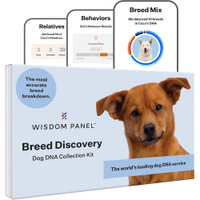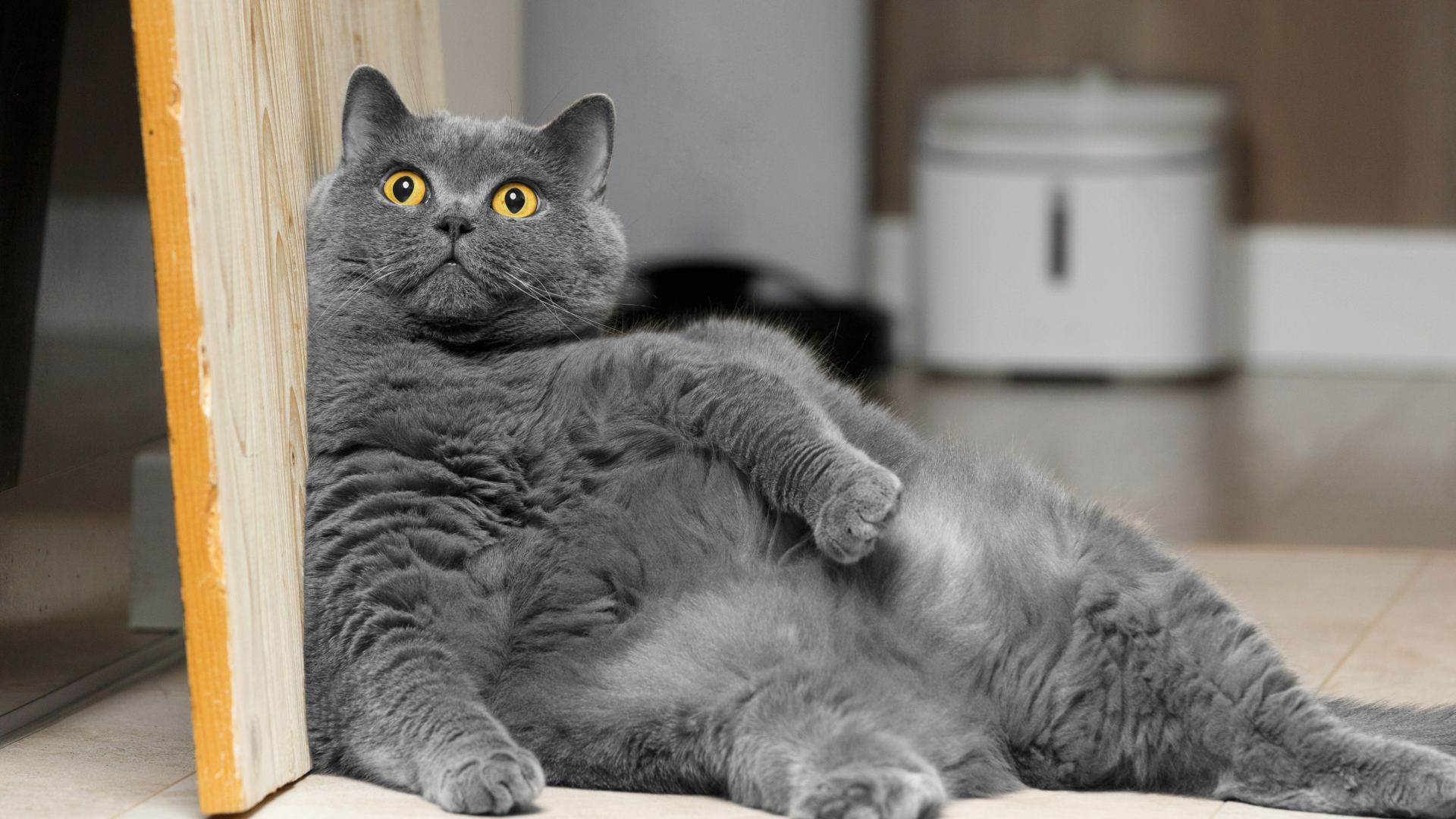Bichon Frise: Breed profile
Bichon Frise pooches are not only adorable to the eye, but they are great for first-time owners
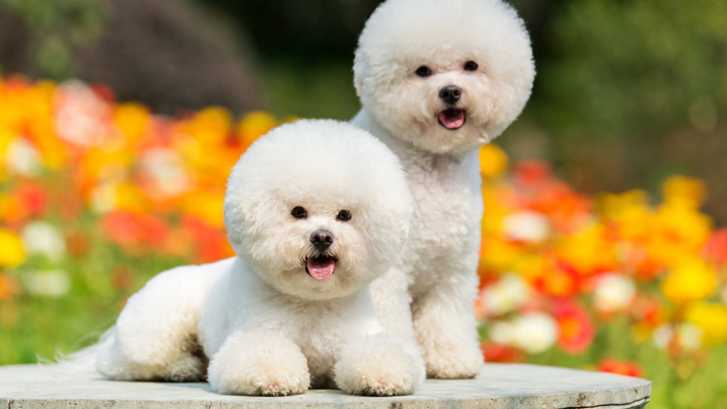
The powder-puff appearance of a Bichon Frise is nothing short of adorable. Throw in a cheerful, playful nature and you've almost got the perfect pet – a popular pooch that ranks among the best dog breeds for first-time owners.
Deriving their name from the French “bichon à poil frisé”, which means “dog with curly hair”, this breed was originally developed on the Canary Island of Tenerife. Catching the attention of French sailors in the 14th century, they were eventually bred as lap dogs for nobility, proving popular across western Europe.
By the time of the French Revolution in 1789, however, they were falling out of favor. Bichon Frises were cast on to the streets as their owners were imprisoned or met a grisly end at the blade of a guillotine. It wasn't until after World War I when the breed started to become popular again.
What we have today, though, is a charming, intelligent little canine, one that is among the best dogs for seniors, and perfect for families who don't have acres of space. As you'll see they love attention, hate being left alone and need a lot of grooming. But they thrive around people, adapt well to family life and are so cuddly-looking that it almost blows your mind.
How much exercise does a Bichon Frise need?
Life expectancy: 12 - 15 years
Average weight: Male: 15lbs/7kg Female: 13lbs/6kg
About the same as: A gallon of paint
Bichon Frises are playful and energetic dogs but you don't have to spend large chunks of your day taking them out for walks. Around 30 minutes will suffice, ideally at a brisk pace, but if you can supplement such activity with fun and games in your yard, then this dog will certainly appreciate it.
For there is no doubt that these mischievous bundles of fun love to be outdoors. They'll happily run around, play fetch and dive into water or simply explore new sights and sounds. But the games don't need to stop when you get back indoors. Bichon Frises will happily engage with the best dog toys, and impromptu activities such as tug of war or hide and seek always go down well.
As with all dogs, the important thing is to keep them mentally as well as physically stimulated so that they don't become destructive and bored. Just take more care when Bichon Frises are puppies so as not to put strain on their joints but step things up a notch when they reach adulthood.
Are Bichon Frises easy to train?
Suitable for: Anyone who wants an intelligent and fun dog
Not suitable for: Anyone who would have to leave them alone for long periods
Temperament: Cheerful, gentle, playful
Shedding: Low
Since Bichon Frises are highly intelligent dogs and very eager to please, training this breed is a simple enough task. You only need to be consistent, firm and patient but it's also vitally important that you take a gentle, positive approach – if you shout at a Bichon Frise then you may as well give up hope.
That's because this breed is highly sensitive and easily frightened so the best approach is to lower your voice to let them know they have done something wrong. Certainly, never, ever lash out at these adorable dogs (not that you would). Instead establish a reward system and withdraw such treats if need be.
For most owners, the greatest challenge is house training. Bichon Frises are independently-minded and they can be quite stubborn. To that end, you're going to have to start early, make good use of crate training and take the dog for frequent trips outside during the earlier months unless you want to be regularly cleaning up mess indoors.
You will also need to firmly encourage a Bichon Frise not to bite. They will do this when they are teething but it has to be corrected otherwise it'll end up being seen as acceptable. The idea is to get them to a point where they know it's okay to chew so long as it doesn't involve someone's hand.
Are Bichon Frises good with kids?
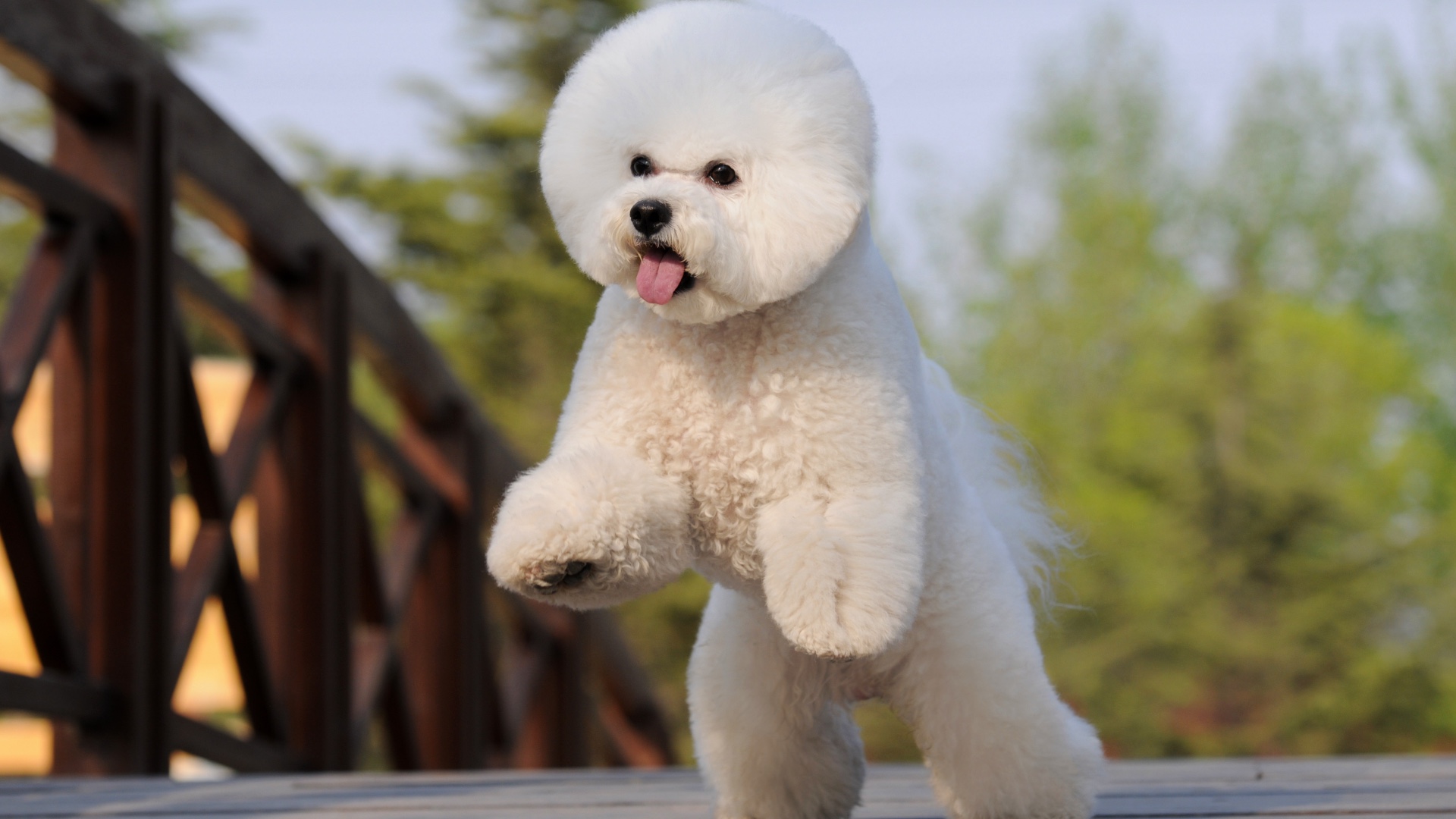
Absolutely! Bichon Frises are sociable and tolerant, and they love being around children. Their small size means there's very little risk if they accidentally bump into a toddler and their playful nature ensures they'll enthusiastically engage in most games.
You will need to teach children how to behave around a Bichon Frise, however, to not only ensure that they're not being too rough but to also reduce the risk of a negative reaction. When pushed, the breed will bite although good training lowers the chance.
What do Bichon Frises eat?
As a small breed, a Bichon Frise needs between 300 and 500 daily calories and that will generally be equivalent to no more than 1.5 cups of the best dry dog food each day, spread over two meals. To be sure they're getting the correct nutritional balance, it's worth considering food specially tailored to the breed such as the Royal Canin dry dog food for adults. Food that lists a whole protein first in the list of ingredients will generally be most suitable.
Do Bichon Frises bark a lot?
Bichon Frises tend to be quiet dogs but if they are playing with other animals or something is bothering them, then cover your ears: their ear-piercing, high-pitched bark can quickly become annoying. In most cases, the barking will be short (but definitely not sweet) but if you're unlucky, then you may have a Bichon Frise who barks all the time.
In such a case, you'll have to spend time addressing the issue through training. If that doesn't solve the problem (the habit can be hard to break) then it would be worth a visit to your veterinarian to rule out an underlying medical condition.
Most of the time, though, there is a clear reason for their barking. They may be feeling fearful or ignored and they'll certainly be vocal if they are left alone for more than a few hours. Separation is the main cause of anxiety in this breed and the “cure” is to ensure you're around a Bichon Frise as much as possible.
Are Bichon Frises aggressive?
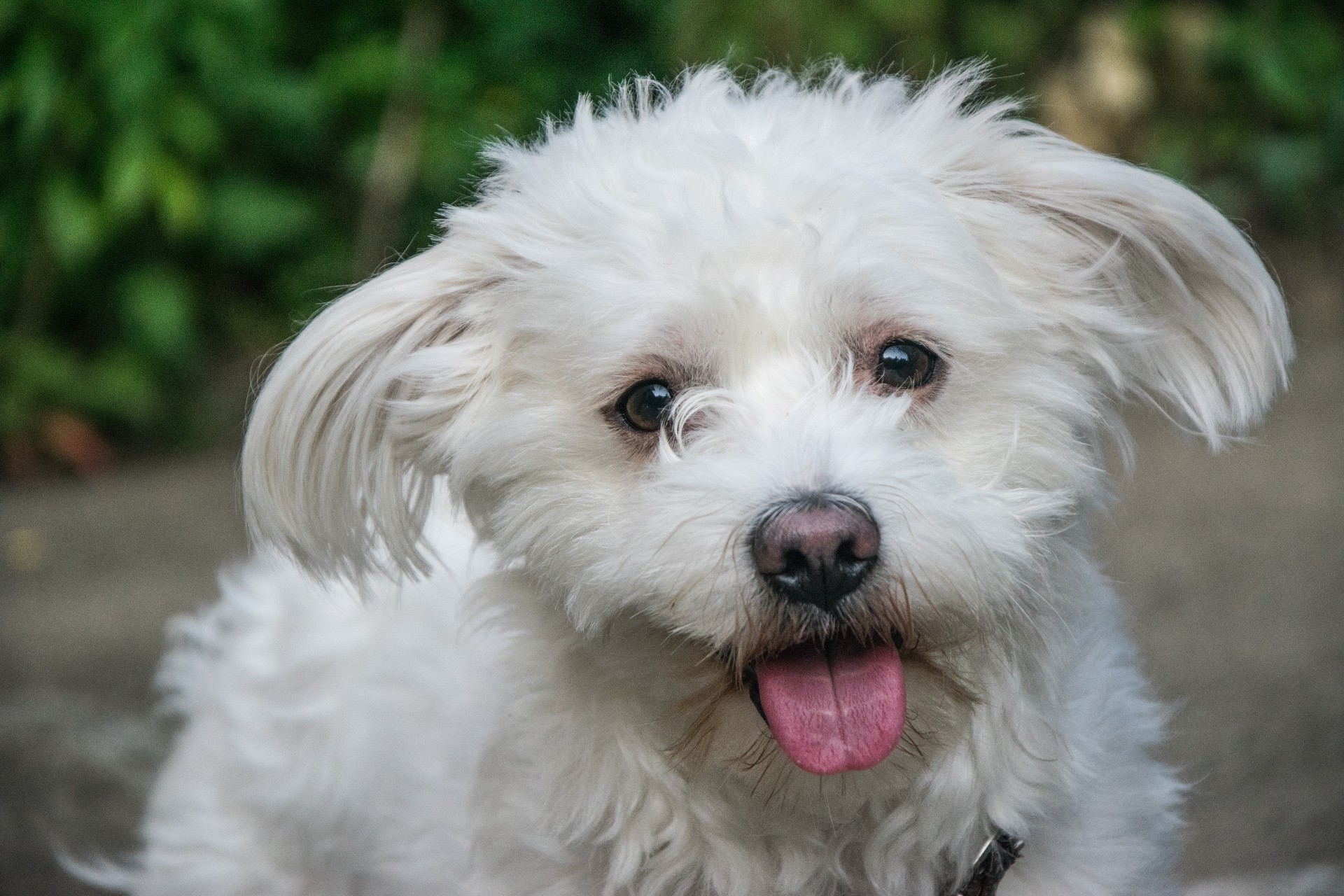
Bichon Frises may look like butter wouldn't melt in their smiling little mouths but they can be aggressive. You can work on this trait by being strong, assertive and giving them sufficient attention. But bear in mind that the breed can display signs of small dog syndrome – overreacting to perceived threats as a way of overcoming their small size.
As well as barking, this can lead to biting and you'll need to quickly work out what is causing the aggression and tackle it. You also need to be particularly wary of timid Bichon Frises because they are particularly prone to becoming aggressive. Early socialization can work wonders in cases such as these. It’s also important that you are not overprotective. Always allow a Bichon Frise to grow in confidence with changing situations by allowing them space.
Do Bichon Frises shed a lot?
Amount of shedding: Low
Easy to groom: No
General health: Good
Potential for weight gain: Low
Although Bichon Frises are among a good number of hypoallergenic dog breeds that should help with the sniffles, that's not to say they don't need grooming. As Elizabeth Racine explains in her guide to what causes shedding and how you can manage it, it's simply a myth that the Bichon Frise doesn't shed.
Instead, loose hairs get caught within the undercoat all year round, more so during shedding seasons. So while you're less likely to find hair all around your home, you'll still need to regularly groom a Bichon Frise using the best dog brushes daily to prevent tangles and matting. You should also bathe this breed often using a gentle shampoo and take them to professional groomers at least every month. Doing so ensures you'll have a healthy, good-looking dog on your hands.
Wisdom Panel Breed Discovery DNA Kit | Amazon
Not sure exactly what breed your dog is? This kit screens for 365+ breeds – because knowing every detail about your dog helps you understand how best to care for them.
Bichon Frise health problems
Bichon Frises are healthy dogs, on the whole, so long as they are well looked after. The main issues are allergies, cataracts, bladder stones, diabetes and luxating patellas where the kneecap moves out of its normal location. But watch out for a Bichon Frise chewing their paws. It's not a major problem but it could indicate their need for a bath or the presence of parasites. It may also be a sign of boredom or anxiety.
Should I get a Bichon Frise?
Given their size, it's perhaps no surprise to learn that Bichon Frises are particularly suitable pets for anyone living in an apartment. They can be exercised physically and mentally indoors (although not exclusively) and, once they've been house-trained, your main concern will be grooming.
This breed can be noisy and aggressive at times, however, and if you're away from home for lengthy chunks of the day, this will only get worse. Bichon Frises are fabulous fun, though, and their affectionate, gentle nature (as well as their cute looks) will melt many a heart.
Want to learn more about this breed? Here are our favorite Bichon Frise facts
PetsRadar Newsletter
Get the best advice, tips and top tech for your beloved Pets

David Crookes has been a journalist for almost 30 years and he has written for a host of magazines, newspapers, websites and books including the World of Animals Annual, BBC Earth, Live Science, The Independent and Tom’s Guide.
Born in England, he lives with two cats but he’s also keenly interested in the differences between the huge number of dog breeds – in fact, you can read many of his breed guides that he’s written in collaboration with vets here on PetsRadar.
With a lifelong passion for technology, too, he’s always on the lookout for useful devices that will allow people to keep their pets happier and healthier, and provide them more time to spend together.
David has a degree from Durham University, as well as postgraduate diploma in journalism from the University of Central Lancashire.
